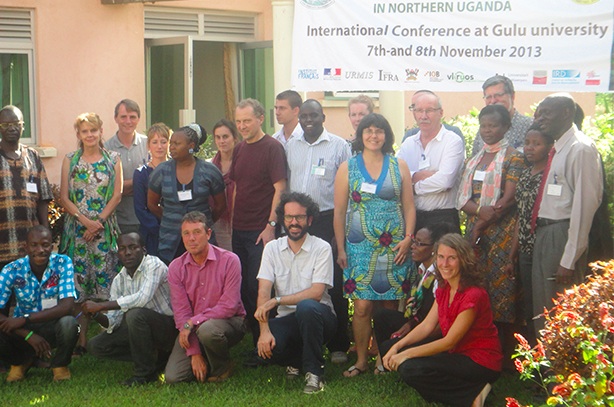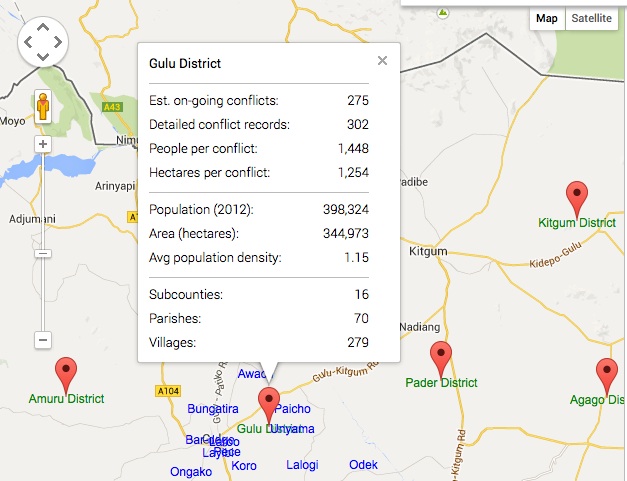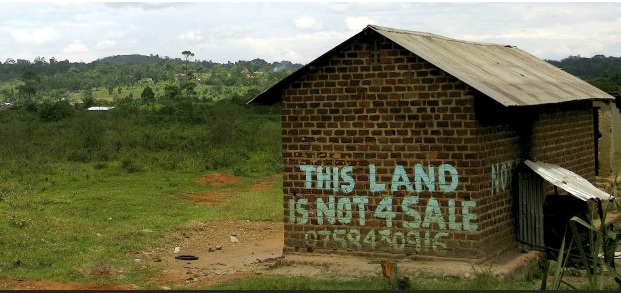
On 07 and 08 November, a conference on governance and post-conflict reconstruction took place in Gulu, hosted by the Institute of Peace and Strategic Studies (IPSS, University of Gulu) and co-organised by the Institute of Development Policy and Management (University of Antwerp) the JSRP partner Conflict Research Group (University of Ghent). Tim Allen and Holly Porter of the Justice and Security Research Program participated in the conference.
The conference was the opening event of the project ‘Governance and post-conflict reconstruction in Northern Uganda’, which is a collaborative 5-year project between the above institutions, hosted by the IPSS. The project will focus on knowledge generation on these issues, by funding PhD scholarship and research projects.
Land conflicts
A major theme of the conference were land conflicts. In Northern Uganda, there is a strong perception of a high level of land disputes in the post-conflict, post-displacement Acholi sub-region, and that these disputes might emerge as a major driver of conflict.
Julian Hopwood presented his large-scale study on conflicts in the Acholi region (co-written with Ron Atkinson) in which they obtained and analysed data on land disputes in the Acholi region. The study showed how over 90% of the rural land is being described as under communal control/ownership – which is highly significant, yet little understood and rarely discussed. With regards to conflicts, the study showed how the overall number of discrete rural land disputes is declining significantly. Findings suggest that disputes are being resolved at a rate of about 50% over a six-month period (late 2011 – beginning 2012). Yet, the number of households affected by disputes remains high – over 18,000.

Other presentations further analysed the multiplex nature of land governance: Rose Nakyai (Makere University) highlighted the weakening and transformation of customary land rights in post-conflict Acholi-land, and the imperative to protect these.
Lioba Lenhart (Gulu University) explained how the meaning of land is much more than economic, as is often assumed. Instead, a multi-dimensional approach needs to be used, taking into account the economic, legal, political, social and cultural implications of land. All of these play a role in governing land and the eruption of conflicts.
Claire Médard and Valérie Golaz (Makerere University, IRD France) presented the results of the conference they organised on land policies in East Africa. They particularly reflected on the relation between land and conflicts, and highlighted how land as such cannot be the cause of a conflict, and particularly highlighted the role of associated identity claims:
Beliefs – identity claims as well as technocratic beliefs – play a role in the way security of tenure is perceived and enhanced. In their own way, they might also contribute to new injustices, fuelling more conflicts
A number of PhD projects were presented which will be carried out under the ‘Trustland’ project, a collaboration between the University of Gulu and the University of Copenhagen, which focuses on the links between land, trust/mistrust and governance, and with a particular focus on gender and generation: projects were presented on
- land rights for women (Stella Laloyo, University of Gulu),
- land access and food security for women (Julaina A. Obika, Gulu University);
- and how land conflicts affect the youth’s sense of belonging and livelihood security (Esther Acio, University of Gulu).

Other presentations focused on youth – for example on their level of inclusion in post-conflict reconstruction programs (Margaret Angucia, Uganda Martyrs University). At the same time, there was a discussion around the usefulness of youth as an analytical category– as Tim Allen noted, given its dominance in the Acholi sub-region, its added value in analyzing these different issues is debatable. He also highlighted how land held different meanings during and after the conflict: during the conflict the LRA invaded the bush and turned it into a nightmare, while people are now reclaiming the land, through which it has almost become a metaphor of how the Acholi sub-region should be.
Post-conflict interventions
A second major theme of the conference were post-conflict interventions. Tim Allen presented how humanitarian interventions take place within different ‘bubbles’ :
Humanitarians rely on rules and norms – from laws or principles, to religious and biomedical values, to best practice and ethical guidelines. The rules and norms create apparently coherent and predictable spaces. They are reassuring, and sometime empowering. They are the basis of what Nicholas Stockton, the former emergencies coordinator of Oxfam, has called the humanitarian ‘confidence trick’ of neutrality (Stockton 1997).
They also allow for thinking that lessens individual responsibility for impossible decisions; decisions that really can mean the difference for someone’s life or death. For humanitarians in the field, they establish spaces in which the horrors they sometimes witness can be observed from a distance, or even – sometimes – not be seen at all.
Denis Musinguzi (Uganda Martyrs University) discussed the engagement of non-state actors in post-conflict reconstruction in Northern Uganda. He highlighted the difficulties of the involvement of non-state actors, such as mistrust by state actors or contestation between peacebuilding as a political strategy and humanitarian relief as a moral imperative.
Aloysius Malagala (IPSS, Gulu University) emphasised how current post-conflict reconstruction efforts in northern Uganda have placed more emphasis on physical infrastructure reconstruction or ‘hardware’, less on ‘software’, such as social infrastructure reconstruction, amending broken relationships.
Holly Porter (JSRP, LSE) presented her research on responses to rape in the Acholi sub-region. She discussed the role of three prominent actors in the aftermath of rape: relatives, NGOs and churches. She reflected on why so many women never access justice or take advantage of available services. In doing so, she showed the profound value of social harmony, and deep distrust of distanced authorities to dispense justice in their interest.
Regional perspectives
Regional perspectives were offered by a number of other presenters, offering a basis for comparison for Northern Uganda. By analyzing the ‘success story of numbers’ , Christian Thibon, (French Institute of Research IFRA, Nairobi) explained the factors contributing to the return of refugees and IDP’s in Burundi; but also showed the limits of problems, part of which are related with this transition from urgency to sustainable development, the overestimated resilience capacities of the household, a vulnerable political system.
Susan Waiyego Mwango (Kenyatta University) highlighted the history of electoral violence and current challenges of reconciliation and reintegration of displaced.
Finally, Kristof Titeca (University of Antwerp, University of Gent) presented the LRA from a regional perspective, and how different humanitarian interventions around the issue take place. Specifically focusing on North-Eastern DR Congo, he highlighted how the LRA rebellion had changed, while at the same time highlighting the similarities with the conflict in Northern Uganda.
Kristof Titeca is a postdoctoral fellow/lecturer based at Institute of Development Policy and Management (University of Antwerp) and the Conflict Research Group (Ghent University); and the Belgian project leader of the above project. The conference benefited from additional funding from the Institut Français and the French Embassy in Kampala.



